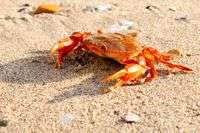Research reveals exotic Henslow Crabs in North Sea

(PhysOrg.com) -- Climate change has led to masses of bizarre swimming crabs to invade the North Sea - hundreds of miles from their usual home, new research has revealed.
The exotic Henslow swimming crabs have moved from the warm seas off Portugal to the increasingly comfortable waters off Britain's east coast.
Experts made the discovery while investigating an increase of the planktonic larvae of North Sea decapods - the microscopic offspring of shrimps and crabs.
With North Sea temperatures increasing by 1 degree C over the last 30 years, it has been populated by the crabs that have used their ability to swim to get there.
The crab is an active hunter and unlike its counterparts that spend its adult life walking around on the sea bed, it has specially modified limbs that are flattened at the tips. These allow it to swim at the sea surface where it can swarm periodically in very large numbers.
The research, published in the Royal Society Journal Biology Letters, has also shown how other crabs have been found for the first time in the North Sea.
The study was led by Dr Richard Kirby, a Royal Society Research Fellow at the University of Plymouth. He worked in collaboration with Dr Alistair Lindley at the Sir Alister Hardy Foundation for Ocean Science and their co-workers at the Wimereux marine station in France.
The experts said the increase in these new species could have a major influence on the North Sea food web. They argue the arrival of the new crabs and shrimps may explain how the effects of climate change have been amplified by the marine food web to bring about an abrupt change in the North Sea ecosystem.
Crabs and shrimps are important predators both as larvae and as adults on the sea bed where they influence the abundance of other animals, such as shellfish and flatfish.
Henslow's swimming crab may be an especially important new predator in the North Sea plankton since it can occur near the sea surface throughout its life.
Dr Kirby said: "The North Sea is now 1 degree C warmer than it was 30 years ago, and as it has warmed the number of crab and shrimp larvae in the plankton and adults on the sea bed has increased.
"What we have now shown is that a component of the changing abundance of decapod larvae in the plankton is the presence of new warm water species such as Henslow's swimming crab Polybius henslowii and the angular crab Goneplax rhomboides.
"Henslow's swimming crab is particularly unusual among crabs by having a pelagic phase as an adult and this behaviour may have helped it to colonise the warming North Sea from the Atlantic.
"Crabs and shrimps are important predators and their prey includes bivalves and young flatfish. Coincident with the increase in crabs and shrimps the abundance of bivalves and young flatfish has declined.
"In the southern North Sea the proportion of crab and shrimps to bivalves in the plankton has doubled since the mid 1980s and importantly, we see similar changes among the adults on the sea bed.
"We believe that the changes in the North Sea decapods could have played an important role in the propagation of climate change through the food web leading to a new North Sea ecosystem, which appears to favour jellyfishes in the plankton, and decapods and sea urchins on sea bed, over commercial fisheries.
"Predictions of global climate change suggest that the seas around our coasts will continue to warm. This may mean that we see the appearance of yet more warm water species that could change the ecology of the North Sea further.
"While you should not worry about swimming alongside Henslow swimming crabs they could give you a nasty nip if find one on the shore and you pick it up the wrong way."
The crabs - Polybius henslowii in Latin - were named after JS Henslow, a Cambridge professor and clergyman who gave up his place on the Beagle to allow Charles Darwin to go.
Provided by University of Plymouth














